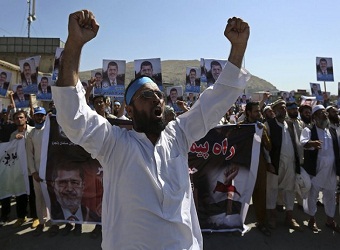Having crushed the Muslim Brotherhood, the Egyptian authorities have begun cracking down on other dissenters, sometimes labeling even liberal activists or labor organizers as dangerous Islamists.
Ten days ago, the police arrested two left-leaning Canadians — one of them a filmmaker specializing in highly un-Islamic movies about sexual politics — and implausibly announced that they were members of the Brotherhood, the conservative Islamist group backing the deposed president, Mohamed Morsi. In Suez this month, police and military forces breaking up a steelworkers strike charged that its organizers were part of a Brotherhood plot to destabilize Egypt.
On Saturday, the chief prosecutor ordered an investigation into charges of spying against two prominent activists associated with the progressive April 6 group.
When a journalist with a state newspaper spoke publicly about watching a colleague’s wrongful killing by a soldier, prosecutors appeared to fabricate a crime to punish the journalist. And the police arrested five employees of the religious Web site Islam Today for the crime of describing the military takeover as a coup, security officials said.
Police abuses and politicized prosecutions are hardly new in Egypt, and they did not stop under Mr. Morsi. But since the military takeover last month, some rights activists say, the authorities are acting with a sense of impunity exceeding even the period before the 2011 revolt against Hosni Mubarak.
The government installed by Gen. Abdul-Fattah el-Sisi has renewed the Mubarak-era state of emergency removing all rights to due process or protections against police abuse. And police officials have pronounced themselves “vindicated.” They say the new government’s claim that it is battling Islamist violence corroborates what they have been saying all along: that it was Islamists, not the police, who killed protesters before Mr. Mubarak’s ouster.
“What is different is that the police feel for the first time in two and a half years, for the first time since January 2011, that they have the upper hand, and they do not need to fear public accountability or questioning,” said Heba Morayef, a researcher for Human Rights Watch.
In the more than seven weeks since Mr. Morsi’s ouster, security forces have carried out at least three mass shootings at pro-Morsi street protests, killed more than a thousand Morsi supporters and arrested at least as many, actions Ms. Morayef characterized as “massive police abuse on an unprecedented scale.” But even beyond the Islamists, she said, “anyone who questions the police right now is a traitor, and that is a protection that they did not have even in 2010,” when public criticism was tolerated and at least a few complaints were investigated.
Prosecutors had already begun investigating Mohamed ElBaradei, the liberal former United Nations diplomat, for “betraying the public trust.”
President Obama has said the new government is on a “dangerous path” marked by “arbitrary arrests, a broad crackdown on Mr. Morsi’s associations and supporters” and “violence that’s taken the lives of hundreds of people and wounded thousands more.”
Warning that “our traditional cooperation cannot continue as usual when civilians are being killed in the streets and rights are being rolled back,” the president canceled a planned joint military exercise. He pledged a review of the $1.3 billion a year in military aid to Egypt, and the State Department took steps to hold back some of the roughly $200 million in nonmilitary aid. But mindful of Egypt’s importance in the region, he stopped short of declaring the takeover an illegal “coup” or cutting off the aid, instead urging an early return to democracy.
Officials of the new government insist they are committed to establishing the rule of law, as soon as they overcome what they describe as the mortal threat to Egypt of violence by the Brotherhood and other Islamist supporters of Mr. Morsi.
The police appear to be rounding up Brotherhood members on the basis of their affiliation, without other publicly known evidence of crimes. Mr. Morsi is being held incommunicado at an undisclosed location. But government spokesmen insist that every individual, including Mr. Morsi, will be tried by a court and released if acquitted.
“It is up to the courts,” Nabil Fahmy, the interim foreign minister, said in a recent interview. All will be handled “in accordance with the rule of law,” he said.
Source: New York Times
